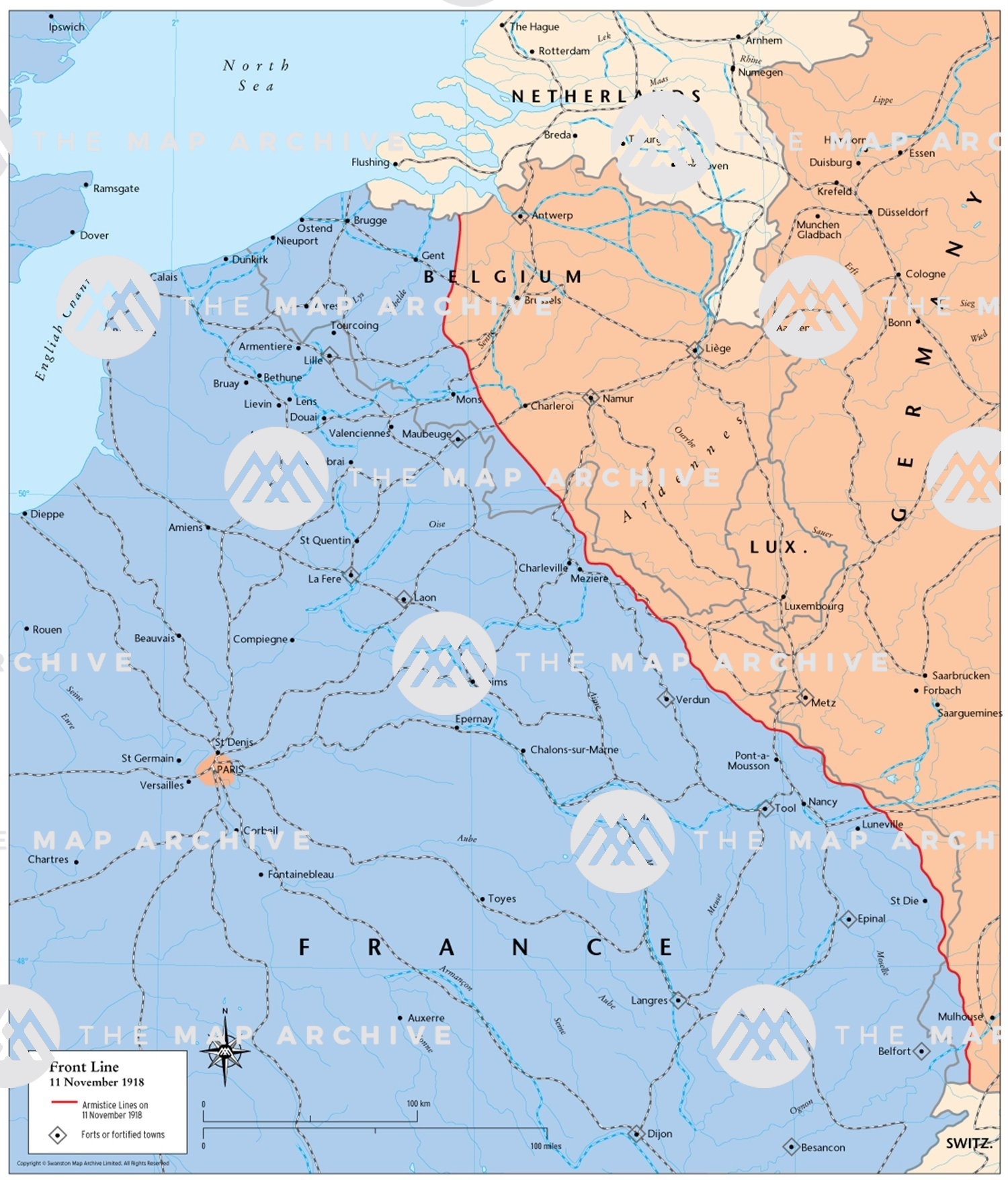On 21 March 1918, the Germans launched a devastating effective offensive on the western front, driving as deep as 37 miles (60 km) into the Allied lines in some places. French and American forces finally halted the German advance in May 1918. By the end of July, the front was being pushed in the opposite direction, urged forward by coordinated attacks by three Allied armies. On 8 August the final great Allied offensive along the length of the front was dubbed the German Army’s ‘black day’. After 100 days of desperate fighting, the writing was on the wall for the Germans and the Chancellor made peace overtures to the Allies.

The Germans hoped that President Woodrow Wilson’s even-handed proposals, outlined in his ‘Fourteen Points’ speech delivered on 8 January 1918, would prevail. Indeed copies of the speech had been dropped behind German lines, disseminating the idea that the Central Powers could expect a just settlement. The Allies, however, were not disposed to leniency. The ceasefire was declared at 11 am on 11 November 1918. Ineffective communication of this cessation of hostilities to front-line forces meant that some 10,000 soldiers were killed, wounded or reported missing on 11 November. The last German soldier to be shot in the hostilities was fired on as he approached American soldiers after 11.00 to inform them of the ceasefire.

German troops immediately withdrew from France, Belgium, Alsace and the Rhineland. Germany was effectively disarmed, forced to surrender the bulk of its weaponry, aircraft, and submarines. Its fleet was interned and the Allies occupied garrisons at Mainz, Koblenz, and Cologne. No negotiation was offered or entertained, but the signatory for the Germans was the secretary of state, Matthias Erzberger, which allowed a canard to be spread later that the Army had been ‘stabbed in the back’ by its own government.The Armistice did not address the disposition of German colonies, Austria-Hungary or the Ottomans. The Armistice formally renounced the Treaties of Brest-Litovsk and Bucharest, imposed by the Central Powers on Russia and Romania, and dissolving the network of satellite protectorates that were being created in annexed eastern front territories. The Allied occupation of the Rhineland would sow the seeds of post-war contention.

 The Germans hoped that President Woodrow Wilson’s even-handed proposals, outlined in his ‘Fourteen Points’ speech delivered on 8 January 1918, would prevail. Indeed copies of the speech had been dropped behind German lines, disseminating the idea that the Central Powers could expect a just settlement. The Allies, however, were not disposed to leniency. The ceasefire was declared at 11 am on 11 November 1918. Ineffective communication of this cessation of hostilities to front-line forces meant that some 10,000 soldiers were killed, wounded or reported missing on 11 November. The last German soldier to be shot in the hostilities was fired on as he approached American soldiers after 11.00 to inform them of the ceasefire.
The Germans hoped that President Woodrow Wilson’s even-handed proposals, outlined in his ‘Fourteen Points’ speech delivered on 8 January 1918, would prevail. Indeed copies of the speech had been dropped behind German lines, disseminating the idea that the Central Powers could expect a just settlement. The Allies, however, were not disposed to leniency. The ceasefire was declared at 11 am on 11 November 1918. Ineffective communication of this cessation of hostilities to front-line forces meant that some 10,000 soldiers were killed, wounded or reported missing on 11 November. The last German soldier to be shot in the hostilities was fired on as he approached American soldiers after 11.00 to inform them of the ceasefire. German troops immediately withdrew from France, Belgium, Alsace and the Rhineland. Germany was effectively disarmed, forced to surrender the bulk of its weaponry, aircraft, and submarines. Its fleet was interned and the Allies occupied garrisons at Mainz, Koblenz, and Cologne. No negotiation was offered or entertained, but the signatory for the Germans was the secretary of state, Matthias Erzberger, which allowed a canard to be spread later that the Army had been ‘stabbed in the back’ by its own government.The Armistice did not address the disposition of German colonies, Austria-Hungary or the Ottomans. The Armistice formally renounced the Treaties of Brest-Litovsk and Bucharest, imposed by the Central Powers on Russia and Romania, and dissolving the network of satellite protectorates that were being created in annexed eastern front territories. The Allied occupation of the Rhineland would sow the seeds of post-war contention.
German troops immediately withdrew from France, Belgium, Alsace and the Rhineland. Germany was effectively disarmed, forced to surrender the bulk of its weaponry, aircraft, and submarines. Its fleet was interned and the Allies occupied garrisons at Mainz, Koblenz, and Cologne. No negotiation was offered or entertained, but the signatory for the Germans was the secretary of state, Matthias Erzberger, which allowed a canard to be spread later that the Army had been ‘stabbed in the back’ by its own government.The Armistice did not address the disposition of German colonies, Austria-Hungary or the Ottomans. The Armistice formally renounced the Treaties of Brest-Litovsk and Bucharest, imposed by the Central Powers on Russia and Romania, and dissolving the network of satellite protectorates that were being created in annexed eastern front territories. The Allied occupation of the Rhineland would sow the seeds of post-war contention.
